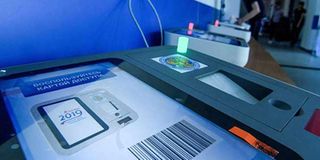Russians go to polls after weeks of opposition protests

Members of a local election commission prepare an electronic terminal at a polling station in Moscow on September 6, 2019. Russia unity election kicked off on September 8. PHOTO | KIRILL KUDRYAVTSEV | AFP
What you need to know:
- Municipal and regional polls are being held across the vast country.
- But most attention is focused on the Moscow parliament vote following the arrests and jailing of independent would-be candidates.
- The elections take place a day after Moscow and Kiev carried out a long-awaited swap of 70 prisoners.
Moscow
Russians voted Sunday in local elections after weeks of opposition protests that led to the biggest police crackdown on dissent in nearly a decade.
The elections take place a day after Moscow and Kiev carried out a long-awaited swap of 70 prisoners, a deal hailed as a first step towards ending five years of conflict after Moscow's annexation of Crimea.
Municipal and regional polls are being held across the vast country, but most attention is focused on the Moscow parliament vote following the arrests and jailing of independent would-be candidates and their supporters.\
KEENLY WATCHED
Analysts say the results of the vote will be keenly watched ahead of parliamentary elections in 2021 and will help shape Russia's political future, as President Vladimir Putin enters his third decade in power.
In recent weeks, tens of thousands have taken part in Moscow protests demanding a fair vote after allies of opposition leader Alexei Navalny were barred from the election. Rap stars and prominent bloggers backed the demonstrations.
CRACKDOWN
Authorities responded with a police crackdown – the biggest since a wave of protests in 2011-12 against Putin's return to the Kremlin after a stint as prime minister.
Alyona Prokhorova, a 46-year-old mother of four, said she was shocked by the clampdown and that for the first time in her life she signed up to be an independent election observer to monitor for possible irregularities.
"Moscow is against this hideousness," she told AFP at a polling station in the city's southwest.
"I still cannot get over it."
GROWING RIFT
Tatyana Stanovaya, head of the R.Politik analysis firm, said the campaign exposed a growing rift between authorities bent on preserving the status quo and Russians wanting political change.
"The Moscow parliament elections have become a litmus test of the authorities' ability to accept this new reality," Stanovaya told AFP.
Authorities briefly jailed nearly all opposition politicians seeking to get on the ballot in Moscow.
Several people were also imprisoned for alleged violence against police, even though opposition supporters said their rallies were peaceful.
Some 7.2 million people are eligible to elect 45 lawmakers in the Moscow parliament, which is dominated by the ruling United Russia party.
But not a single candidate is formally running on the United Russia ticket as the party's popularity hits rock bottom.
SMART VOTING
Navalny has put forward a "Smart Voting" plan urging Muscovites to support those who have the highest chances of beating pro-Kremlin candidates. Most of them are Communists.
The 43-year-old lawyer described the vote as a referendum on whether Russians trust authorities and the ruling party.
"The only way to say 'NO' is coordinated voting for the strongest competitors of the United Russia candidates," he wrote.
"'Smart voting' is a protest," said Lyubov Sobol, a lawyer for Navalny's Anti-Corruption Fund who refused food for more than a month after her exclusion from the ballot.
BRIGHTEST STAR
The 31-year-old has emerged as the brightest star in a new generation of political challengers, with videos of her resisting authorities going viral.
The chief of the central election commission, Ella Pamfilova, said that a dozen opposition candidates were disqualified because they did not provide the right papers or faked some of their supporters' signatures.
Russians were electing governors in 16 regions and elections to legislative assemblies were taking place in 13 regions.
The race for the governor's seat in Saint Petersburg has become the most controversial campaign outside Moscow, with the Kremlin backing the unpopular gaffe-prone acting city chief Alexander Beglov.
Polling stations in Moscow opened at 0500GMT and will close 12 hours later.





